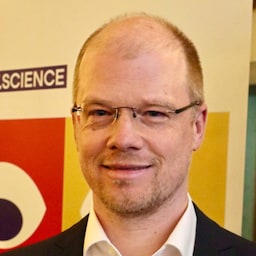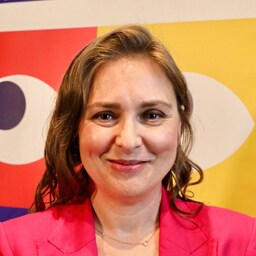"Cool" science
Researching with children: “They are bursting with curiosity”
Do you know what a genome is and what the genome of a virus looks like? No? Don't be ashamed, almost all of us do. But not necessarily children: Scientists are also properly corrected by our tough offspring when they make mistakes. What is it like when researchers and kids meet? An insight.
Admittedly: Science sounds like a lot of effort to understand something. But it doesn't have to be that way. "FÄKT" is the name of a new project of the Austrian Academy of Sciences (ÖAW). The aim is to meet young people where they actually spend their time - on social media. Up to now, this space has not been particularly popular with researchers, who are adults after all.
Yet working with children is great, reveals scientist Andreas Bergthaler from MedUni Vienna and the Austrian Academy of Sciences' Research Center for Molecular Medicine (CeMM).
"Young people are bubbling over with questions and curiosity," Bergthaler knows from his day-to-day work. "They are easily inspired by tricky questions that science tries to answer."
The potential of children is incredibly great and needs to be awakened and encouraged.

Univ. Prof. Dr. Andreas Bergthaler, MedUni Wien, CeMM der ÖAW
Bild: Martin A. Jöchl
Young people surprise the researcher time and time again: "Children's questions are sometimes uncompromisingly direct and logical."
This excites him, because "it always inspires me and also allows me to leave well-trodden paths and a certain tunnel vision behind".
We want to know whether he has ever been improved by children. "It happens all the time," says Bergthaler: "Just last month, a ten-year-old girl corrected me at a school seminar. I had explained the genome of viruses in a somewhat simplified way, but she knew that this was not entirely correct."
Reaching less educated classes too
"I think it's important to give the next generation an understanding of the world of research," emphasizes the expert, "what can research do and what can't it do? What great discoveries are top Austrian researchers making? And how does science influence our everyday lives and the future?"
"The potential of children is incredibly great and needs to be awakened and encouraged," says Bergthaler.
During a laboratory internship, he himself experienced "how exciting it can be to explore new things in a mixture of detective and mushroom hunter".
He wants to pass this on to young people - and above all reach those from less educated backgrounds.
You can demonize TikTok and the like - or simply go on TikTok yourself.

Univ.-Prof. Dr. Ivona Brandic, TU Wien
Bild: Martin A. Jöchl
Researchers in the social media
The ÖAW's new "FÄKT" project is now intended to help with this - with short videos and "shorts" with local scientists on exciting topics from children's everyday lives that are suitable for young people.
The whole thing is not only prepared for school lessons, but also specifically for social media.
Ivona Brandic, a computer scientist from Vienna University of Technology, knows that this was previously an area that many scientists were hesitant to venture into, if at all: the first "FÄKT" video was shot with her.
Social media needs quality-assured knowledge
"We researchers are actually communication professionals," says Brandic. But: "Only in our own bubbles and channels. Social media is not one of them." She also had reservations at first, she reveals.
However, young people spend a lot of time on TikTok and the like: "You can demonize it - or just go on TikTok yourself. I did that too, it's fun."
Above all, Brandic emphasizes, "we shouldn't leave such channels to conspiracy theorists, but you can make a video or two yourself alongside power points".
Not bulky, dry and dusty at all
With "FÄKT", the children would receive quality-assured knowledge directly from the source, i.e. the respective researchers: "We research the questions and can provide answers that don't exist," says Brandic. "That is the didactics of the 21st century, I would say."
In addition, the videos also convey unwieldy scientific topics in a way that is "easy for children to digest".
You can find information and videos here
- Homepage: www.faekt.science
- YouTube: https://www.youtube.com/@faekt.science
- Instagram: https: //www.instagram.com/faekt.science
- TikTok: https://www.tiktok.com/@faekt.science
- Edutube: http://www.edutube.at/#FÄKT
Further plans
By mid-2025, up to 30 "science videos" are to be produced with "FÄKT" and significantly more "shorts" in line with social media - incidentally with hosts who are also suitable for young people, namely the two students Marie-Sophie "Miso" Tschak and Julia Winkler, both in their early 20s.
We ask Bergthaler whether there are already plans to expand "FÄKT", for example to a summer camp - after all, he and his colleagues came up with the idea for the project.
"For me, 'FÄKT' is a great experiment that is now starting." Of course, experiments can also fail - "but even then they still provide valuable results for the next experiment."
"I secretly hope that 'FÄKT' will succeed in building a lasting bridge between science and young people based on trust and equality," says Bergthaler.
He adds with a smile: "If this offer proves popular, there are already a few more ideas for 'FÄKT'."
This article has been automatically translated,
read the original article here.












Da dieser Artikel älter als 18 Monate ist, ist zum jetzigen Zeitpunkt kein Kommentieren mehr möglich.
Wir laden Sie ein, bei einer aktuelleren themenrelevanten Story mitzudiskutieren: Themenübersicht.
Bei Fragen können Sie sich gern an das Community-Team per Mail an forum@krone.at wenden.